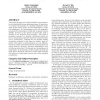Free Online Productivity Tools
i2Speak
i2Symbol
i2OCR
iTex2Img
iWeb2Print
iWeb2Shot
i2Type
iPdf2Split
iPdf2Merge
i2Bopomofo
i2Arabic
i2Style
i2Image
i2PDF
iLatex2Rtf
Sci2ools
116
click to vote
ATAL
2009
Springer
2009
Springer
On the significance of synchroneity in emergent systems
The goal of this paper is to explore the effects of synchronization on distributed decision making processes. In particular, we examine the dynamics of a spatially distributed multiagent system where agents use local information to make role assignments. By investigating several role assignment procedures for this problem, we find that, in general, system stability increases as the number of agents that make a decision at any particular time decreases. This result is promising, because in a physical, distributed system the time at which agents make their decisions would most likely not be synchronized. Although the two decision making procedures examined in this paper are similar, their dynamics with respect to synchronization are very different. One shows a linear relationship between synchronization and system behavior, whereas a non-linear relationship is seen with the second method. We demonstrate the significance of synchroneity on the dynamics of these complex systems and argue ...
Related Content
| Added | 12 Aug 2010 |
| Updated | 12 Aug 2010 |
| Type | Conference |
| Year | 2009 |
| Where | ATAL |
| Authors | Adam Campbell, Annie S. Wu |
Comments (0)

